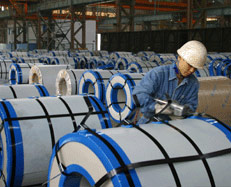
Despite central government announcements in April prohibiting management buy-outs of medium-sized to large state-owned enterprises (SOEs), the Guangdong Provincial State Assets Supervision and Administration Commission has come up with measures to bolster the performance of SOEs.
In late August, the commission, which manages 1.2 trillion yuan (US$148.3 billion) worth of state assets, about one ninth of the country's total, made some bold strides forward in this aspect.
On August 29, a provincial working conference was held in Guangzhou. It was decided that a draft ruling on rewards or incentives would be released to solicit public opinion. The draft stipulates that if local SOEs achieve operational targets, management and project teams will be rewarded with a share of the profits.
The main push for the draft ruling came from the success of a pilot scheme that the provincial government implemented way back in 1997.
In 1997, Guangdong-based TCL Group, a 100-percent SOE specializing in home appliances, electronics and telecommunications handsets, was chosen to participate in the pilot scheme.
Li Dongsheng, chairman of the board of directors of the group, signed a five-year operation deal affirming that the group's net asset value was 243 million yuan (US$30 million) and setting a target of annual net asset growth at no less than 10 percent.
If the group achieved a growth rate of between 10 to 25 percent, management would be rewarded with a 15 percent share of the increment; if the rate was between 25 to 40 percent, they would get a 30 percent share; if the rate was above 40 percent, they would get a 45 percent share.
Between 1997 and 2001, TCL's net asset value grew by 63.75 percent, 80.43 percent, 63.25 percent, 56.24 percent and 24.35 percent respectively. Rewards were given in cash in 1997, but since then they have been converted into stakes in the group. Li and two senior executives, who together form the group's labor union, have a total 16.56 percent stake in the group. State ownership is down to 58 percent.
The draft ruling aims to replicate the TCL success story.
However, not all SOEs will qualify. City-level SOEs are excluded straight off, and only 21 provincial-level firms, which handle a total of over 300 billion yuan (US$37 billion) in state assets will participate in the first-phase of reform.
According to Liu Haibin, a division head with the commission, there are other conditions as well.
First, the qualifying SOE must be in a highly competitive sector such as IT and telecommunications. SOEs that have a monopoly or that are considered to be resources firms do not qualify. Further, the SOE must have completed internal restructuring in the areas of industrial structure adjustment, resource integration and management reorganization.
Second, the enterprise should have a clear development strategy and identifiable core businesses.
Third, the enterprise should have a clear equity and internal control mechanisms in place.
Net asset value is also an important indicator for appraisal purposes. Parameters will be set by the commission.
The draft also stipulates a set indicator designed to measure and identify cash flow and, more important, the source of profit.
"The cash earned by selling land and properties are not calculated into their revenues," Liu said.
"Once the operation targets are set, we will publicize them and hire independent audit institutions to appraise them. The appraisal results will be reported to the provincial audit office and the supervision department for review," Liu said.
Guangdong's proposed ruling, the first of its kind in the country, has caught the attention of the State Assets Supervision and Administration Commission (SASAC), the watchdog overseeing 169 central-government-invested SOEs.
"To give certain amount of stake to senior executives of state firms which achieve good returns is different from a management buy-out," SASAC head Li Rongrong was quoted as saying.
In a China Business report published on Monday, an unidentified source was cited as saying that the amendment of China's Corporate Law and the publication of a notice on SOE reform, which are expected soon, would lay a solid foundation for the the implementation of the ruling nationwide.
(China.org.cn by Tang Fuchun, September 8, 2005)
|

